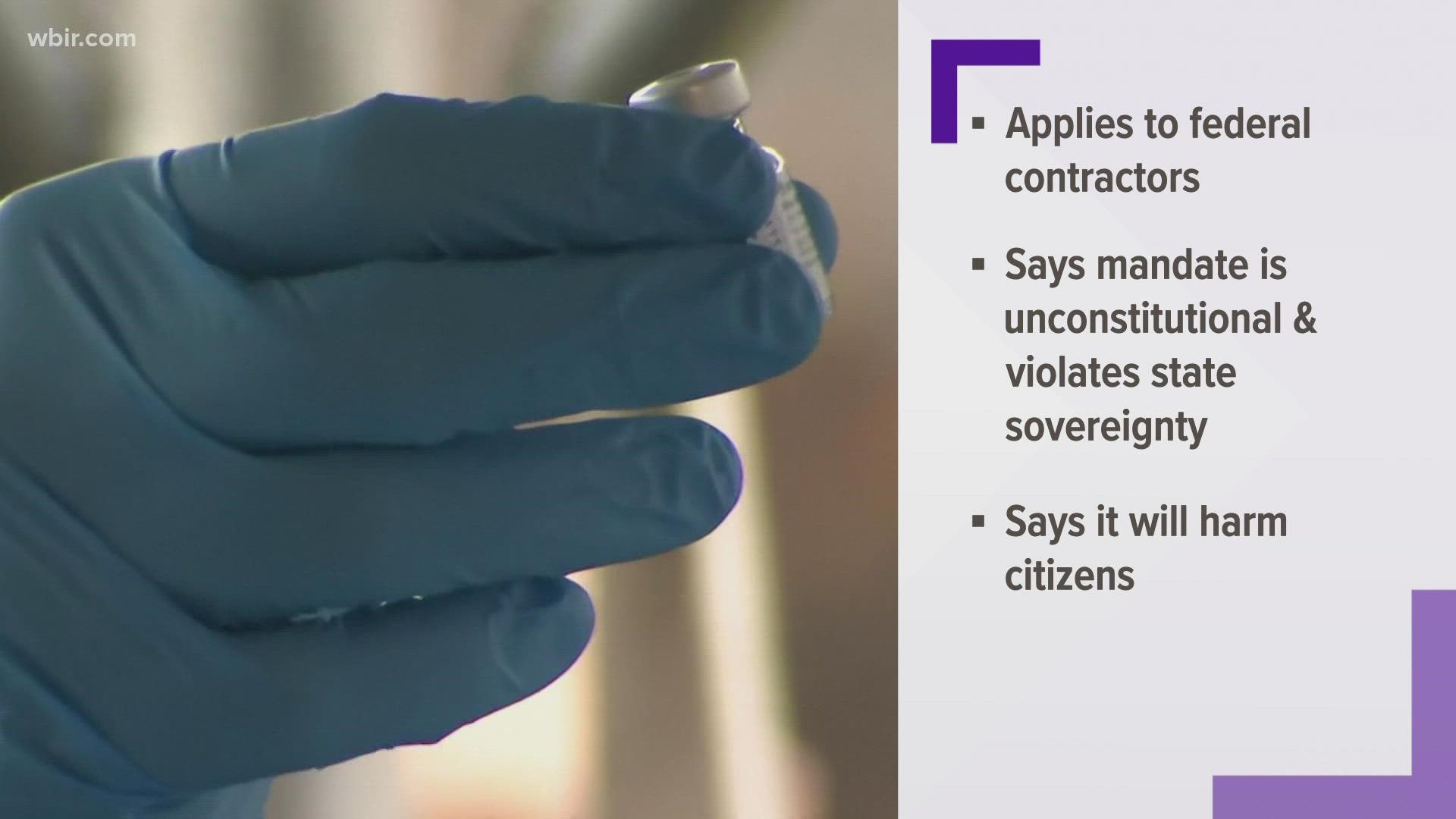NASHVILLE, Tenn — Tennessee's Attorney General joined six other states in filing a joint appeal in circuit court Friday challenging President Joe Biden's COVID-19 vaccine mandate, this time targeting emergency OSHA rules for private businesses with 100 or more employees that enforce vaccines or weekly testing.
Attorney General Herbert Slatery and six other attorney generals from Kentucky, Ohio, Idaho, Kansas, Oklahoma and West Virginia petitioned the U.S. Court of Appeals for the Sixth Circuit to review OSHA's new Vaccination and Testing Emergency Temporary Standard (ETS), which was formally published in the Federal Register on Friday.
The new OSHA ETS generally applies to private businesses with 100 or more employees to enforce workplace safety measures, which require those employees to either get fully vaccinated for COVID-19 or to be tested for COVID-19 weekly.
Slatery and the other AGs are asking for a ruling from the court by November 12 to review the validity of the new OSHA rule. Even if the judge declines to temporarily block the mandate, the AGs are hoping for a swift response from the courts in order to quickly move their case up to the Supreme Court before the January 4 deadline for employers to comply with the new OSHA rule.
The attorneys general said they believe OSHA lacks statutory and constitutional authority to issue the rules, claiming OSHA's general power to issue an ETS were limited by U.S. Congress to "grave dangers" posed by exposure to substances like chemicals and asbestos.
OSHA enforces far more than chemical and industrial safety measures in workplaces, though. Biological hazards (including viruses and bacteria) are documented workplace hazards in several industries, particularly healthcare.
The key term "grave danger" has not been specifically defined in any statutes or regulations to date, according to a Congressional Research Service report on the matter as it applied to a different ETS over COVID-19 in healthcare settings back in September 2021.
The CRS report said it's clear Congress did not want OSHA's ability to issue an ETS to be used as a measure to circumvent the regular standard-setting process when it passed the OSH Act of 1970, saying an ETS is intended specifically as a temporary measure to react quickly in "fast-breaking emergencies" where the normal rulemaking process would delay action to prevent workplace deaths or injuries.
OSHA had said the SARS-CoV-2 virus met the "grave danger" criteria for the following reasons:
- The health consequences of COVID-19, including mortality and short-term and long-term health consequences from COVID-19, even in cases determined by the Centers for Disease Control and Prevention (CDC) to be “mild”
- The elevated risk of COVID-19 transmission in the workplace due to common elements of workplaces such as shared work spaces
- The risk of COVID-19 transmission in health care settings where known or suspected infectious patients are receiving medical treatment.
Now that OSHA has issued multiple COVID-19 ETSs, the agency is required to begin the full rulemaking processes to make those permanent standards within six months. The ETSs won't necessarily become the permanent standard, but will serve as the example for creating them.
COVID-19 is not the first biological workplace hazard to require employers to implement measures regarding vaccines, but the ETS does stand out for being the first general OSHA measure to go beyond recommending vaccines to explicitly require them as part of a mitigation effort. For example, companies that have employees who work around blood and other bodily fluids are required by OSHA to offer the hepatitis B vaccine to workers, or test them for antibodies to ensure they received the vaccine series and are immune. If a worker declines the vaccine, they have to sign a declination form and be informed of their risk of catching hepatitis B.
OSHA has also recognized the right of private employers to independently enforce vaccine requirements as a condition of employment. The safety net for unvaccinated employees on OSHA's end is its whistleblower rights, which the agency has maintained in the past can be used to protect employees from retaliation if they have a documented health condition that creates a reasonable belief that a vaccine would pose "real danger of serious illness or death."
Also, if a worker reports an adverse reaction to a workplace-mandated vaccine, the employer is required to record and report it under OSHA's recordkeeping rules for workplace injuries. For COVID-19, though, OSHA has suspended enforcement of those recordkeeping requirements through at least May 2022, arguing doing would appear as if it is discouraging COVID-19 vaccines for workers and workplaces:
"DOL and OSHA, as well as other federal agencies, are working diligently to encourage COVID-19 vaccinations. OSHA does not wish to have any appearance of discouraging workers from receiving COVID-19 vaccination, and also does not wish to disincentivize employers' vaccination efforts. As a result, OSHA will not enforce 29 CFR 1904's recording requirements to require any employers to record worker side effects from COVID-19 vaccination at least through May 2022. We will reevaluate the agency’s position at that time to determine the best course of action moving forward."
OSHA has rarely issued ETSs in the past, with the most recent one prior to the COVID-19 pandemic being issued in 1983 to lower permissible standards for asbestos exposure in the workplace. The congressional report said that ETS was challenged in the Fifth Circuit Court of Appeals a year later and subsequently invalidated by the judge's ruling for not demonstrating the necessity of the actions, with the judge also ruling the ETS duplicated OSHA's existing permanent standard of requiring respirators.

